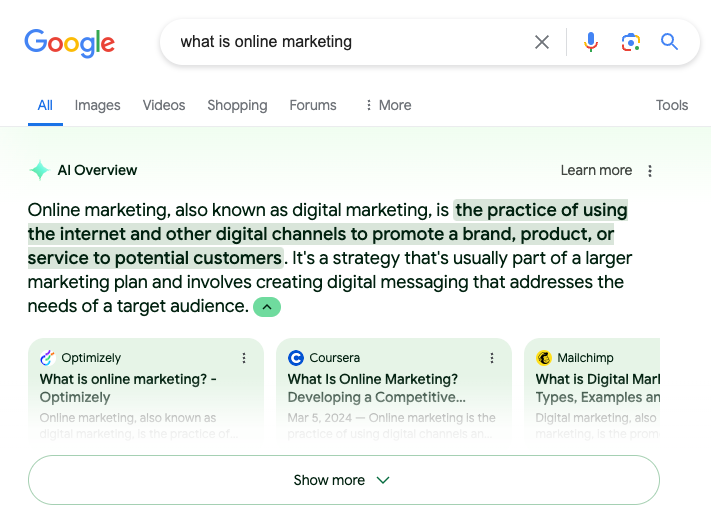Will Google’s AI Overviews Kill Traditional SEO? How to Adapt
Google’s AI Overviews (formerly Search Generative Experience, or SGE) is changing how people find information online. Instead of clicking on traditional search results, users now get instant AI-generated answers at the top of Google.
This raises a big question: Will AI Overviews kill traditional SEO?
The short answer: No, but SEO must evolve.
In this guide, we’ll break down:
✅ What Google’s AI Overviews are
✅ How they impact organic traffic
✅ Real case studies of sites affected by AI answers
✅ 5 actionable strategies to adapt your SEO in 2025
What Are Google’s AI Overviews?
AI Overviews are AI-generated summaries that appear at the top of Google search results. Instead of showing just links, Google now provides direct answers, pulling information from multiple websites.

Example:
Search Query: “How to study for exams”
Old Google Results (Before AI Overviews):
- Blog Post: “10 Study Tips” (ExampleBlog.com)
- YouTube Video: “Last-Minute Exam Tricks”
- Reddit Thread: “How I Topped My Class”
- University Guide: “Study Strategies” (Oxford.edu)
👉 You had to open multiple links to get full advice.
New AI Overview Result:
Google’s AI combines the best parts from all these sources:
“Pomodoro Technique” (from Oxford.edu)
“Best time to study” (from a science blog)
“Real student tips” (from Reddit)
Short video clip (from the YouTube tutorial)
What Changed?
- Google gives a summary upfront; no need to click.
- Only trusted sources (.edu, experts) are used.
- Personal tips (like Reddit) make it relatable.
Why This Matters
- Faster Answers: Get key tips in seconds.
- Better Sources: AI avoids spammy blogs.
- SEO Tip: If you write study guides, add:
- Expert quotes (teachers/professors)
- Real student stories
- Short videos (e.g., “2-minute revision hack”)
Key Difference:
AI Overviews don’t just summarize one page they create new answers from multiple sources.
How AI Overviews Work: Google’s New Ranking System
Google’s AI prioritizes content based on:
- E-E-A-T Signals
- Expertise (author credentials)
- Experience (first-hand testing)
- Authoritativeness (backlinks)
- Trustworthiness (site security)
2. Content Structure
- Clear headings (H2, H3)
- Step-by-step formats
- FAQ schemas
3. Freshness & Engagement
- Updated within last 6 months
- Low bounce rates
- High dwell time
Read our Article to Know more




Comments
Post a Comment